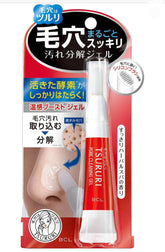Comment conserver les soins de la peau japonais pour maximiser leur fraîcheur et leur efficacité
Les soins de la peau japonais sont réputés pour leur ingrédients délicats et de haute qualité : extraits fermentés, plantes fraîches et actifs photosensibles. Cependant, un stockage inapproprié peut dégradent les formules, réduisent l’efficacité et même favorisent la prolifération des bactéries .
Pour conserver vos produits aussi frais que le jour où vous les avez achetés, suivez ces conseils Conseils de rangement approuvés par J-beauty — directement des experts de Kyoto et de Tokyo.
1. La règle d'or : éviter la chaleur et l'humidité
❌ Ne jamais conserver les produits de soin dans :
-
Salles de bains (la vapeur des douches décompose les actifs)
-
Près des fenêtres (les rayons UV dégradent les ingrédients)
-
Voitures chaudes ou lumière directe du soleil (en particulier pour la vitamine C et le rétinol)
✅ Endroits idéaux :
-
Un tiroir frais et sombre (comme la commode de votre chambre)
-
Réfrigérateur de soins de la peau (pour certains produits, voir ci-dessous)
Conseil de pro : Si tu doit garder les produits dans la salle de bain, utiliser un récipient hermétique avec des packs de gel de silice pour absorber l'humidité.
2. Que contient le réfrigérateur à produits de soins de la peau ?
Les amateurs de beauté japonais utilisent souvent mini-réfrigérateurs (comme Coffret de soins rafraîchissants Missha pour prolonger la durée de conservation. Voici les avantages du refroidissement :
✔ Sérums à la vitamine C ( Rohto Melano CC ) – Ralentit l’oxydation.
✔ Masques en feuille ( Lululun ) – Améliore l’effet dégonflant.
✔ Gels hydratants ( Nature Hatomugi Gel ) – Sensation rafraîchissante.
✔ Crèmes pour les yeux ( Shiseido Benefiance ) – Réduit les poches du matin.
🚫 Ne PAS réfrigérer :
-
Produits à base d'huile (peuvent se solidifier)
-
Crèmes à émulsions lourdes (la texture peut changer)
3. Gardez l'air à l'extérieur pour éviter la contamination
Les marques japonaises comme Hada Labo et Kikumasamune utiliser souvent pompes sans air pour une raison :
✔ Pour les bouteilles sans pompe :
-
Utiliser un spatule propre (jamais les doigts !) pour prélever le produit.
-
Transférez dans des bouteilles plus petites si vous ne finissez pas bientôt ( les contenants de voyage Muji fonctionnent bien ).
✔ Pour les flacons compte-gouttes :
-
Essuyez l'embout compte-gouttes après chaque utilisation.
-
Conserver à la verticale pour minimiser l’exposition à l’air.
4. Soyez attentif à ces signes de détérioration
Même les produits non ouverts expirent ! Les étiquettes japonaises utilisent souvent période après ouverture (PAO) symboles (par exemple, « 6M » = à utiliser dans les 6 mois).
🔴 Jetez-le si vous voyez :
-
Séparation ou agglomération ( les toners ne doivent jamais être troubles ! )
-
Changements de couleur (la vitamine C devient jaune/brune)
-
Odeurs désagréables (les produits fermentés doivent sentir la levure et non le rance)
Note: Formules naturelles (comme Les produits de la gamme pour peaux sensibles de MUJI expirent plus rapidement que ceux contenant beaucoup de conservateurs.
5. Ajustements saisonniers du stockage
Les femmes japonaises changent de routine selon la saison : le rangement est également important !
-
Été: Réfrigérer les crèmes plus épaisses pour éviter qu’elles ne fondent.
-
Hiver: Conservez les toniques/essences à température ambiante (le froid peut provoquer une cristallisation).
6. Voyagez intelligemment
✈️ Pour les vols :
-
Utiliser bouteilles de voyage en silicone (moins susceptible de fuir que le plastique).
-
Envelopper les liquides dans film alimentaire sous le capuchon.
🏨 Dans les hôtels :
-
Conserver les produits dans le réfrigérateur minibar (loin de la nourriture).
-
Évitez de les laisser directement dans le flux d'air de la climatisation (cela assèche les formules).
7. Conseils spécifiques aux marques japonaises
-
Polissage du riz de Tatcha : Garder la poudre sec comme un os (l'humidité l'agglutine).
-
Lotion au saké Kikumasamune : La bouteille rose est protégée contre les UV, mais conservez-la à l'ombre !
-
Crèmes solaires Biore : La chaleur déstabilise les filtres UV : ne les laissez jamais dans une voiture chaude.
Réflexion finale : traitez les soins de la peau comme des aliments frais
Tout comme les sushis nécessitent une manipulation appropriée, votre essences fermentées, sérums à la vitamine C et huiles botaniques méritent un stockage soigné. Suivez ces règles et vos produits seront à la hauteur de vos attentes. fraîcheur et résultats maximum .
Besoin d'aide pour vous organiser ? Achetez notre Essentiels de rangement pour les soins de la peau (réfrigérateurs, pompes airless et plus) !








